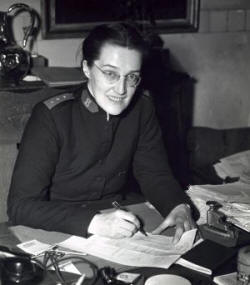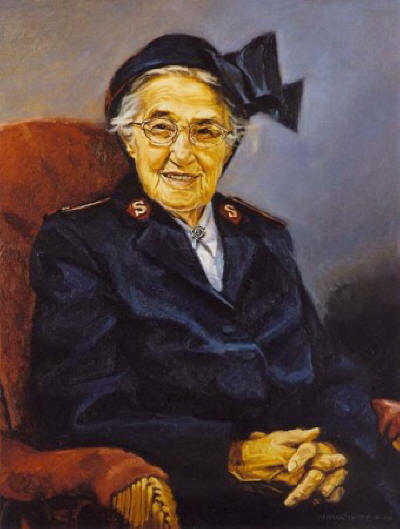

Queer Places:
De Nieuwe Ooster
Amsterdam, Amsterdam Municipality, Noord-Holland, Netherlands
 Alida
Margaretha Bosshardt (June 8, 1913 - June 25, 2007) , best known as Major Bosshardt,
was a major in the Salvation Army.
Alida
Margaretha Bosshardt (June 8, 1913 - June 25, 2007) , best known as Major Bosshardt,
was a major in the Salvation Army.
She was the daughter of Lambertus Bosshardt (1885-1945), grocer, representative, later journalist, and Wilhelmina Dieuwertje Teeling (1881-1955). Alida Margaretha Bosshardt remained unmarried. Alida Bosshardt was the youngest in a Dutch Reformed family. She grew up with brother Henk (1910-1990) and great-nephew Jan Pennings, who lived with them. Because the family often moved, Alida attended several girls' schools. Despite problems – her father lost his job because he became a Catholic – the atmosphere in her youth was good, with a caring but nervous mother and an easier-to-live father. In eighth grade, Alida went to work in housekeeping at home and in a manufacturing business. She wanted to be a nurse, but was not hired as an apprentice nurse because she was often ill and visually impaired in one eye. In 1931, Alida went with Jan Pennings' girlfriend to religious meetings of the Salvation Army. A year later, she joined. After some objections, her parents accepted Alida's decision; her father bought her the uniform and hallelujah hat. The Salvation Army also saw Alida's weak constitution as a risk, although she still began training as a Salvation Officer in 1934. Her father was a financial guarantor of any medical expenses. After her training, cadet lieutenant Bosshardt came to work in the Rotterdam children's home and the following year she was transferred to the Amsterdam children's home. When the Army was officially banned in 1941, the Army continued this children's work in private homes. From 1943, the children – many of them Jewish – were housed elsewhere in the country. When her father died shortly after the war, Alida Bosshardt considered resigning to care for her mother. However, it did not come to that, because her mother moved in with her and later found shelter in an Army retirement home. In these postwar years Bosshardt continued the children's work by tracking down guardianship children and children in hiding. Inspired by the Women's Social Work with which she had come into contact at the Amsterdam Headquarters, she founded the Goodwill work on 8 October 1948 in support of prostitutes. That project became her life's work. Until 1971, Captain – later Major – Bosschardt had to do without a municipal grant and the financial support of the Army was also limited. Thirty years after its founding, the centre had four locations and more than 100 employees. The Goodwill Center was not just for prostitutes; it was 'a supermarket of services', 'a spiritual and social centre for people, without regard for the person', to help with problems such as alcoholism and poverty. Bosshardt's particular interest was the work among prostitutes; Her final thesis of the Social Work, Social Work programme among prostituted women (1961) also dealt with this subject. This sociological knowledge later echoed through in her lectures, in which she told her audience how many percent of the men present probably visited a prostitute. Bosshardt did not condone prostitution, nor did she have the illusion that the phenomenon could be eradicated. And if it had to exist, the women had to be legally allowed to build a reasonable life with it. Moreover, prostitution was in her eyes 'not the worst sin there was'. She did, however, want to help women return to society, for example by setting up a transit house. She criticized the double standards in the regulations: prostitution was a criminal offence, but the state did make money from it.

In the 1950s, the writing press already paid a lot of attention to Bosshardt's work in the 'red light district' and in 1959 she was on television for the first time in the VARA program Unlike others. The donations that poured in after that performance were used for the Goodwill work. Bosshardt had a special bond with the royal family: Queen Juliana invited her shortly after the war. On April 28, 1965, Princess Beatrix joined Major Bosshardt as an intern to sell The Battle Cry on the Red Light District. Despite the disguise with wig, glasses and raincoat, the princess was recognized by photographer Peter Zonneveld; his photographs were in De Telegraaf the next day and then went around the world. The next day, on Queen's Day, Bosshardt gave a press conference to explain this. Two months later she was a guest at the engagement of Beatrix and Claus. Especially with queen and princess Juliana she had a lot of contact; the princess was also present at the festivities when Bosshardt turned 80. Through her work on the Red Light District, Bosshardt came into contact with café owners such as the lesbian Bet van Beeren, with whom she sometimes spent New Year's Eve and at whose funeral she spoke, and with underworld figures such as Zwarte Joop of Casa Rosso. Her uniform opened doors but also created distance in the sometimes grim nightlife. More harmless was her contact with Anton Pieck – he made drawings for a Goodwill book – with the poet Nel Benschop, and with Herman Brood, who she bathed in the TV-program Villa Felderhof. The latter made her known to a new, younger audience. After her mother's death in 1955, Alida Bosshardt began to travel more. On behalf of the Army, she attended international conferences on prostitution and social work. She met colleagues like Mother Teresa, who she found somewhat conservative. Life as a salvation soldier Bosshardt had seen much of the sexual life of others, but she herself remained a virgin – as she told in Villa Felderhof. She said she had been in love with a woman before and there was gossip about her relationship with Bet van Beeren, but a relationship with a woman could not be reconciled with her standards. Alida Bosshardt would have liked to have a family and children of her own, but the men she fell in love with were already married. The Salvation Army rejects homosexuality, but according to Bosshardt, the Dutch department – especially in the Randstad – is more tolerant than the international leadership. She herself had a gay salvation soldier as an intern. She was concerned 'whether they are happy with it themselves and if they are, then it's ok', but she wouldn't be consecrated for same-sex marriage because that wasn't entirely God's intention. In the face of the loss of the right to self-determination, joining the Army also brought her a great deal of freedom of movement for her personally. God had made her 'make choices freely, independently', but if you want freedom, 'you will have to take care of that yourself'. Major Bosshardt retired in 1978, but she continued to give lectures and hawk The Battle Cry. She also took a course in aged care in America. In the years that followed, she literally traveled the world. Her 90th birthday was celebrated in June 2003 with colleagues from the Army and acquaintances from the show world and business. She received congratulations from the royal family, an image in the Goodwill Center and from the State of Israel the Yad Vashem for her children's work in the war. Alida Bosshardt died four years later. She had kept control of her own life until the end and chose to be buried in the grave for Army officers at the Nieuwe Ooster cemetery. Her funeral was broadcast live on television on 30 June 2007. Reputation Although Bosshardt would eventually be given the rank of lieutenant colonel, she remained the major to the general public. She attributed her fame – she was nominated for the election of Greatest Dutchman – to a combination of factors: the sensational neighbourhood in which she worked, her optimistic appearance and her social movement, which she simply articulated. During her life she received many awards and other expressions of recognition: she was appointed Knight (1965) and Officer (1985) in the Order of Orange-Nassau and in 2004 the Yad Vashem. A plane was named after her, she was given a statue with Madame Tussaud and stamps from TNT, in 2006 the Major Bosshardt Prize was first awarded and in 2010 she was named 'top woman of all time' by the readers of the Margriet. The 125th anniversary of the Salvation Army in the Netherlands was celebrated on 11 May 2012 with the Majoor-Bosshardtgala.Bosshardt's attitude in social discussions was a remarkable combination of principled fortitude and pragmatic flexibility; strict with itself and tolerant of others. This applied to her attitude towards (gay) sexuality, birth control, euthanasia and abortion. However, she found Dutch society too materialistic and too tolerant: good – not necessarily Christian – guidelines were indispensable. Her motto 'Everyone is equal before God, including me' also applied to people who did not live by God's rules or adhered to another faith. But there was also criticism of the major, especially for her dismissive attitude to homosexuality.
My published books: